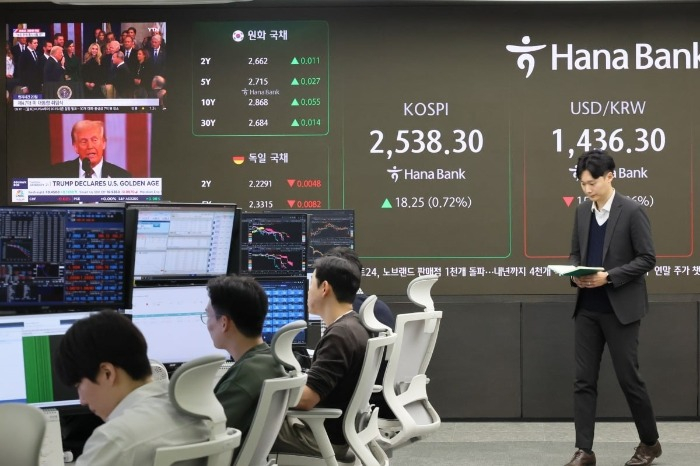South Korea to tighten delisting rules to remove ailing firms
Based on the new rules, some 199 companies will be delisted from South Korean stock market in 2029
By Jan 21, 2025 (Gmt+09:00)
LG Chem to sell water filter business to Glenwood PE for $692 million


Kyobo Life poised to buy Japan’s SBI Group-owned savings bank


KT&G eyes overseas M&A after rejecting activist fund's offer


StockX in merger talks with Naver’s online reseller Kream


Mirae Asset to be named Korea Post’s core real estate fund operator



South Korea will sharply raise the threshold for listed companies to remain trading on the domestic stock market to facilitate the delisting of financially troubled companies, top regulators announced in a joint statement on Monday.
Under the new rules, companies listed on the Kospi main bourse are required to maintain a minimum market capitalization of 50 billion won ($35 million) by early 2028. Otherwise, they will be removed from the Korea Exchange.
That represents a tenfold increase from the current threshold of 5 billion won.
For companies trading on the Kosdaq junior market, the minimum market capitalization will be raised to 30 billion won from the current 4 billion won. They also need to meet the requirement by early 2028.
The revised regulations were unveiled by the Financial Supervisory Service (FSS), Financial Services Commission (FSC), Korea Financial Investment Association and Korea Exchange.
MINIMUM REVENUE REQUIREMENTS
The regulatory bodies will also toughen minimum revenue requirements.
Kospi-listed firms must boost annual sales to 30 billion won by early 2029 to avoid delisting. Those trading on the Kosdaq should raise their sales to 10 billion won by the same deadline.
Currently, the threshold for their sales is 5 billion won and 3 billion won, respectively.
However, the revenue rules will not apply to Kospi-listed companies with a market cap of 100 billion won or more and Kosdaq-traded firms with a market cap of 60 billion won or more.

It marked the first revision to the relevant rules in 22 years.
“South Korea's stock market has easier listing requirements compared with other major stock exchanges, while the delisting process takes longer,” said an FSC official.
From 2019 to 2024, an average of 99 companies went public either on the Kospi or Kosdaq annually. The tally excluded real estate investment trusts and special purpose companies.
By comparison, the number of delisted companies stood at an average of 25 during the same period.
As of the end of 2024, trading in 83 companies has been suspended by the Korea Exchange. However, they are still included in the calculation of stock market cap, weighing down the broader stock market indices.

SHORTER DELISTING PERIOD
Under the revised rules, some 199 companies will be delisted in 2029, said regulatory officials. The regulators will also shorten the delisting period.
The figure breaks down to 62 companies on the Kospi and 137 on the Kosdaq, representing 8% and 7% of the number of stocks traded on their respective stock markets.
Additionally, South Korea will step up accounting oversight rules to prevent companies from manipulating financial results to avoid delisting.
It will also tighten investigations into companies that remain after hiving off major businesses and listing them to determine whether the remaining entities meet the listing qualifications.
From 2029, delisted companies will be allowed to trade in a designated section of the over-the-counter (OTC) market operated by the Korea Financial Investment Association for six months.
Some of them may continue to trade on the OTC market if they meet the conditions set by the KOFIA.
Write to Han-Gyeol Seon at always@hankyung.com
Yeonhee Kim edited this article.
-
 CryptocurrenciesKorea seeks tighter control over digital coins, mulls mandatory disclosures
CryptocurrenciesKorea seeks tighter control over digital coins, mulls mandatory disclosuresJan 15, 2025 (Gmt+09:00)
4 Min read -
 Korean stock marketForeign investors sells $3.86 bn in S.Korean stock market
Korean stock marketForeign investors sells $3.86 bn in S.Korean stock marketJan 15, 2025 (Gmt+09:00)
1 Min read -
 Korean stock marketKospi to move in 2,350-3,200 range in 2025: brokerages
Korean stock marketKospi to move in 2,350-3,200 range in 2025: brokeragesDec 31, 2024 (Gmt+09:00)
2 Min read -
 Foreign exchangeKorea to relax FX rules by December to boost dollar selling
Foreign exchangeKorea to relax FX rules by December to boost dollar sellingDec 23, 2024 (Gmt+09:00)
3 Min read -
 Foreign exchangeSouth Korea to ease foreign exchange regulations, expand FX swap line
Foreign exchangeSouth Korea to ease foreign exchange regulations, expand FX swap lineDec 20, 2024 (Gmt+09:00)
4 Min read -
 Korean stock marketKorean stocks diverge: Winners, losers of Yoon’s martial law debacle
Korean stock marketKorean stocks diverge: Winners, losers of Yoon’s martial law debacleDec 04, 2024 (Gmt+09:00)
3 Min read -
 Korean stock marketKorean pension funds buy a net $1.2 bn in Kospi stocks in November
Korean stock marketKorean pension funds buy a net $1.2 bn in Kospi stocks in NovemberNov 27, 2024 (Gmt+09:00)
2 Min read -
 Corporate restructuringKorea’s E-Mart to delist troubled building unit for restructuring
Corporate restructuringKorea’s E-Mart to delist troubled building unit for restructuringSep 30, 2024 (Gmt+09:00)
2 Min read


